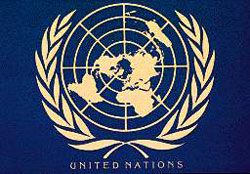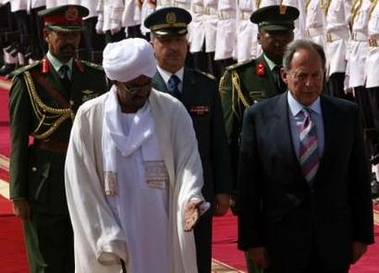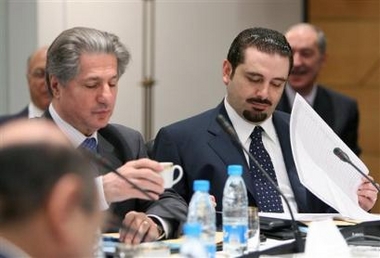 BEIRUT, 30 March (IRIN) - A UN Security Council (UNSC) decision authorising UN Secretary-General Kofi Annan to hold negotiations with Beirut on the establishment of a tribunal to try suspects in the murder of former Lebanese Prime Minister Rafik Hariri received positive reactions among some circles. "This is a positive step towards revealing the truth behind Hariri's death," said Michael Young, a Beirut-based political analyst.
BEIRUT, 30 March (IRIN) - A UN Security Council (UNSC) decision authorising UN Secretary-General Kofi Annan to hold negotiations with Beirut on the establishment of a tribunal to try suspects in the murder of former Lebanese Prime Minister Rafik Hariri received positive reactions among some circles. "This is a positive step towards revealing the truth behind Hariri's death," said Michael Young, a Beirut-based political analyst.
May Chidiac, a Lebanese journalist, who also is a popular television presenter, whose news bulletins and Sunday programmes – Naharkoum Sa
 Chairman of the Arab Summit, Sudanese President Omar al-Basheer, appealed on Tuesday for the stabilization of the relationship between Syria and Lebanon and rejected US pressure on Syria. "Out of solidarity, we have to look to Syria and Lebanon and suppor them in the face of pressure that Syria is facing through unjust laws ... and we support a free will and independent decision for Lebanon," al-Basheer said.
Chairman of the Arab Summit, Sudanese President Omar al-Basheer, appealed on Tuesday for the stabilization of the relationship between Syria and Lebanon and rejected US pressure on Syria. "Out of solidarity, we have to look to Syria and Lebanon and suppor them in the face of pressure that Syria is facing through unjust laws ... and we support a free will and independent decision for Lebanon," al-Basheer said.
The chairman of last year's summit, Algerian President Abdel Aziz Bouteflika, said that Syria and Lebanon enjoy "extraordinary ties." "As much as we are keen on revealing the truth about the assassination of former Lebanese prime minister Rafik al Hariri, we also call on our brothers in Syria and Lebanon to maintain their brotherly close ties that bind the two brother nations since old times," Bouteflika said. The 18th Arab League Summit kicked off with key Arab leaders absent from the meetings that are expected to tackle a number of thorny regional issues. The Arab foreign ministers who met two days earlier to set the agenda of the summit had rejected any US or Israeli pressure on Syria and stressed Lebanon's right to sovereignty.
The talks, which resumed after a five-day break, are aimed at ending Beirut's political paralysis which set in after Syria pulled out its troops after dominating life in its tiny neighbour for some three decades. "Talks focused on one essential subject, that of the presidency of the republic ... and this point remains on the agenda for the next session, next Monday," parliamentary speaker Nabih Berri told journalists after the meeting which lasted fewer than three hours. Earlier at the start of the talks, Samir Geagea, head of the former Christian militia, the Lebanese Forces,, told journalists: "We do not expect that the remaining problems will be resolved during Monday's session." The Lebanese newspapers al-Balad and as-Safir both suggested that the question of the presidency would have to wait for decisions taken at the Arab summit in Khartoum this week. By Henri Mamarbachi - BEIRUT Lebanon's leaders held fresh talks on Monday focusing on one of the most contentious issues dividing supporters and opponents of Syria - the fate of President Emile Lahoud whom the parliamentary majority wants to oust.
By Henri Mamarbachi - BEIRUT Lebanon's leaders held fresh talks on Monday focusing on one of the most contentious issues dividing supporters and opponents of Syria - the fate of President Emile Lahoud whom the parliamentary majority wants to oust.
Khazen History


Historical Feature:
Churches and Monasteries of the Khazen family

St. Anthony of Padua Church in Ballouneh
Mar Abda Church in Bakaatit Kanaan
Saint Michael Church in Bkaatouta
Saint Therese Church in Qolayaat
Saint Simeon Stylites (مار سمعان العامودي) Church In Ajaltoun
Virgin Mary Church (سيدة المعونات) in Sheilé
Assumption of Mary Church in Ballouneh
1 - The sword of the Maronite Prince
2 - LES KHAZEN CONSULS DE FRANCE
3 - LES MARONITES & LES KHAZEN
4 - LES MAAN & LES KHAZEN
5 - ORIGINE DE LA FAMILLE
Population Movements to Keserwan - The Khazens and The Maans
ما جاء عن الثورة في المقاطعة الكسروانية
ثورة أهالي كسروان على المشايخ الخوازنة وأسبابها
Origins of the "Prince of Maronite" Title
Growing diversity: the Khazin sheiks and the clergy in the first decades of the 18th century
Historical Members:
Barbar Beik El Khazen [English]
Patriach Toubia Kaiss El Khazen(Biography & Life Part1 Part2) (Arabic)
Patriach Youssef Dargham El Khazen (Cont'd)
Cheikh Bishara Jafal El Khazen
Patriarch Youssef Raji El Khazen
The Martyrs Cheikh Philippe & Cheikh Farid El Khazen
Cheikh Nawfal El Khazen (Consul De France)
Cheikh Hossun El Khazen (Consul De France)
Cheikh Abou-Nawfal El Khazen (Consul De France)
Cheikh Francis Abee Nader & his son Yousef
Cheikh Abou-Kanso El Khazen (Consul De France)
Cheikh Abou Nader El Khazen
Cheikh Chafic El Khazen
Cheikh Keserwan El Khazen
Cheikh Serhal El Khazen [English]
Cheikh Rafiq El Khazen [English]
Cheikh Hanna El Khazen
Cheikha Arzi El Khazen
Marie El Khazen